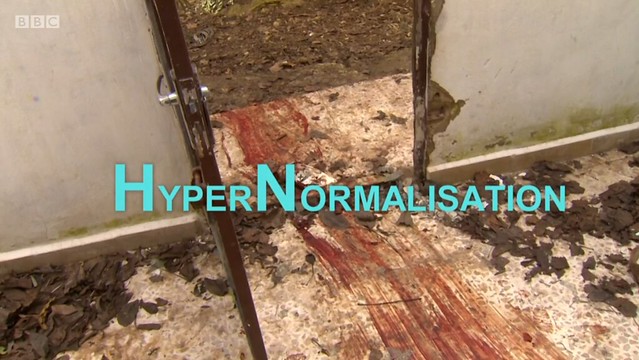
British Documentarian Adam Curtis gives a constantly captivating, digestible rundown on how we arrived at the shitshow that is our current world in 2hr 45min runtime. It's not because I do not appreciate his connect-the-dots-stupid approach or near conspiratorial tone, I do on the contrary- it's coherent no brainer stuff, but I am just surprised how broad Curtis's strokes are at the same time how narrow his scope is.
The docu's self-fulfilling circular narrative concerns three things - the rise of financial institutions over the political system, the Pan-Arab movement against the west backfiring spectacularly and chaos rules - as demonstrated by Putin and his allies.
It starts out with the tale of two cities in 1975 - New York and Damascus. Banks took hold of power over city when the city went bankrupt. The opportunist in chief Trump sneaked his way in to profit off of it. In Syria, Hafez al Assad (father of Bashar) tried to unite Arab countries against western influence. His influence in Lebanon and suicide bombing in the US military barracks that ultimately caused US pullout was the beginning of the gruesome suicide bomber tactic in the region.
Hypernormalisation is the term used to describe the society at end of Soviet empire where disillusioned people didn't believe a word from politician's mouth and effectively lived in a seemingly normal society where things could collapse at any minute. Curtis then connects this to the rise of technology and the internet, where people took to escape the ugly reality, so even though it's heavily regulated and commerced, they had a false sense of freedom.
Most of the time the film makes sense and it hurts to face the obvious example of the failure - rudderless Occupy Movement and Arab Spring. And he makes a good case for the rise of Basket of Kittens and Putin using instability and chaos to keep their enemies at bay. That Basket of Kittens's election win and Brexit were completely expected and not a fluke. But I'm pretty sure Curtis was well aware of his predicament when he sets out to make a film about the increasingly chaotic world in a straight forward fashion that everything is not black and white, that however he makes Assad that suicide bomb guy, Putin the mastermind of destabilization, the internet free but not free, he is no journalist.
Starting the film from 1975 on, Curtis is disregarding the whole colonial history of the Middle East and the history of capitalism since the industrial revolution. Hypernormalisation's conundrum of presenting an extremely complicated world in a concise way is obviously showing. It might be an impressive feat at first, but Curtis's use of scenes from Carrie and a repeated youtube clip of preteens dancing almost descend the whole movie into a typical mainstream documentary.